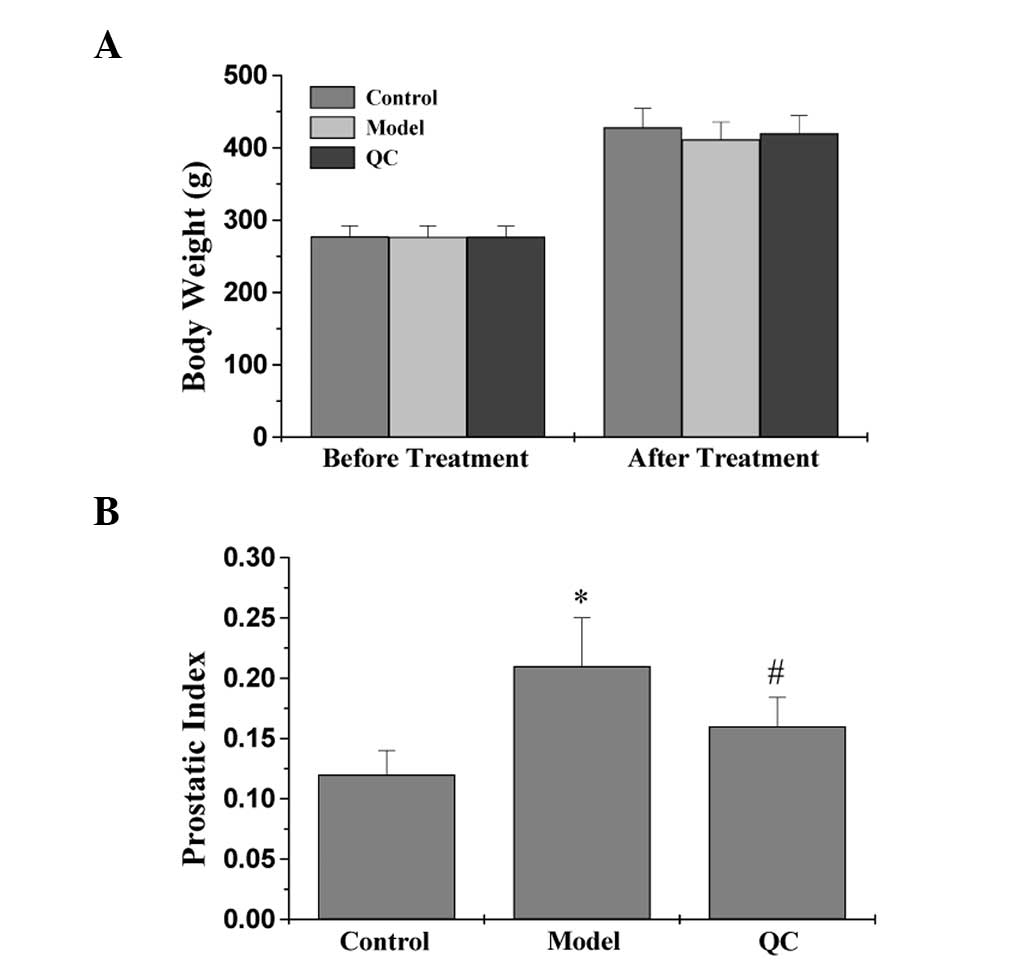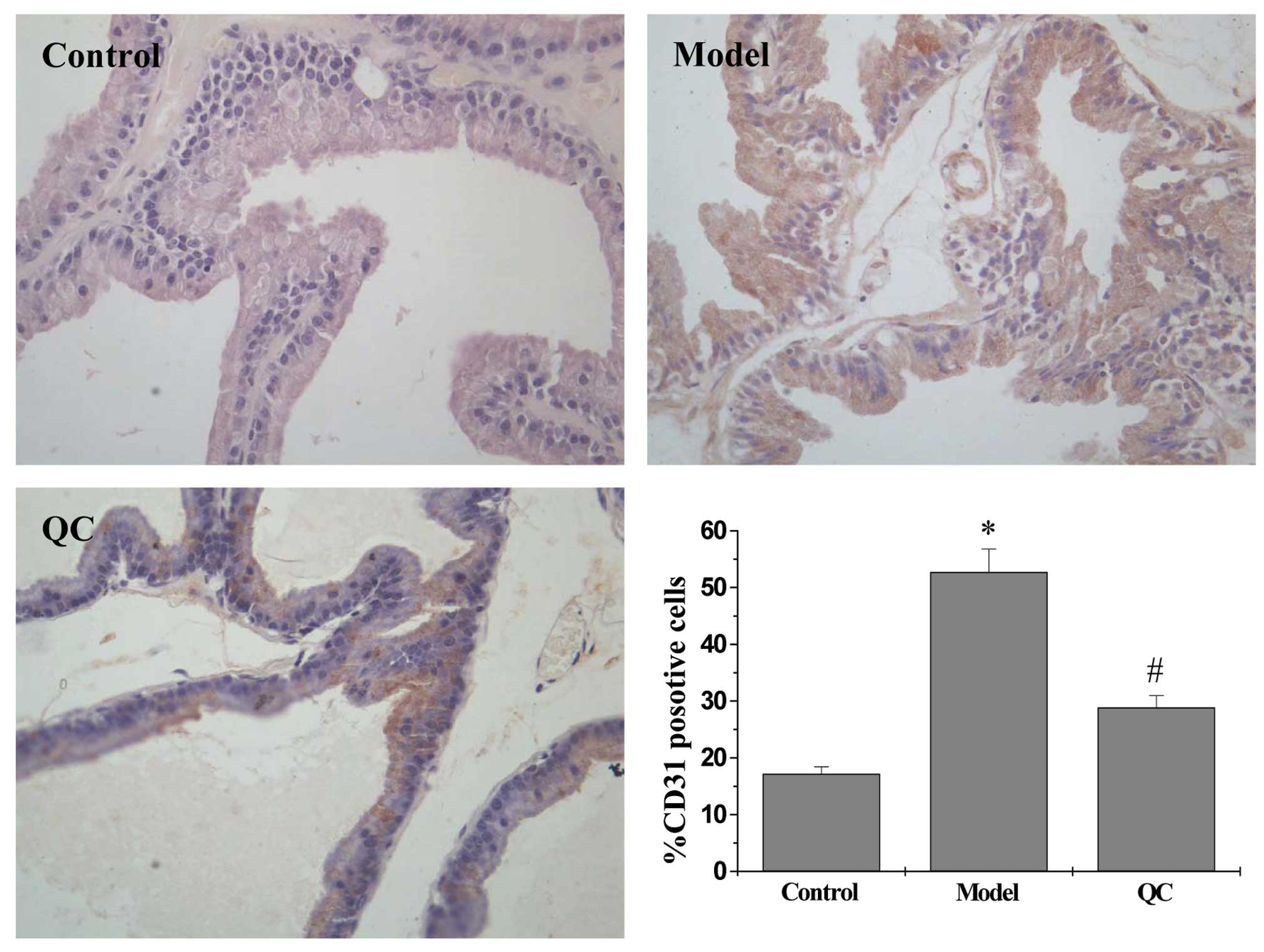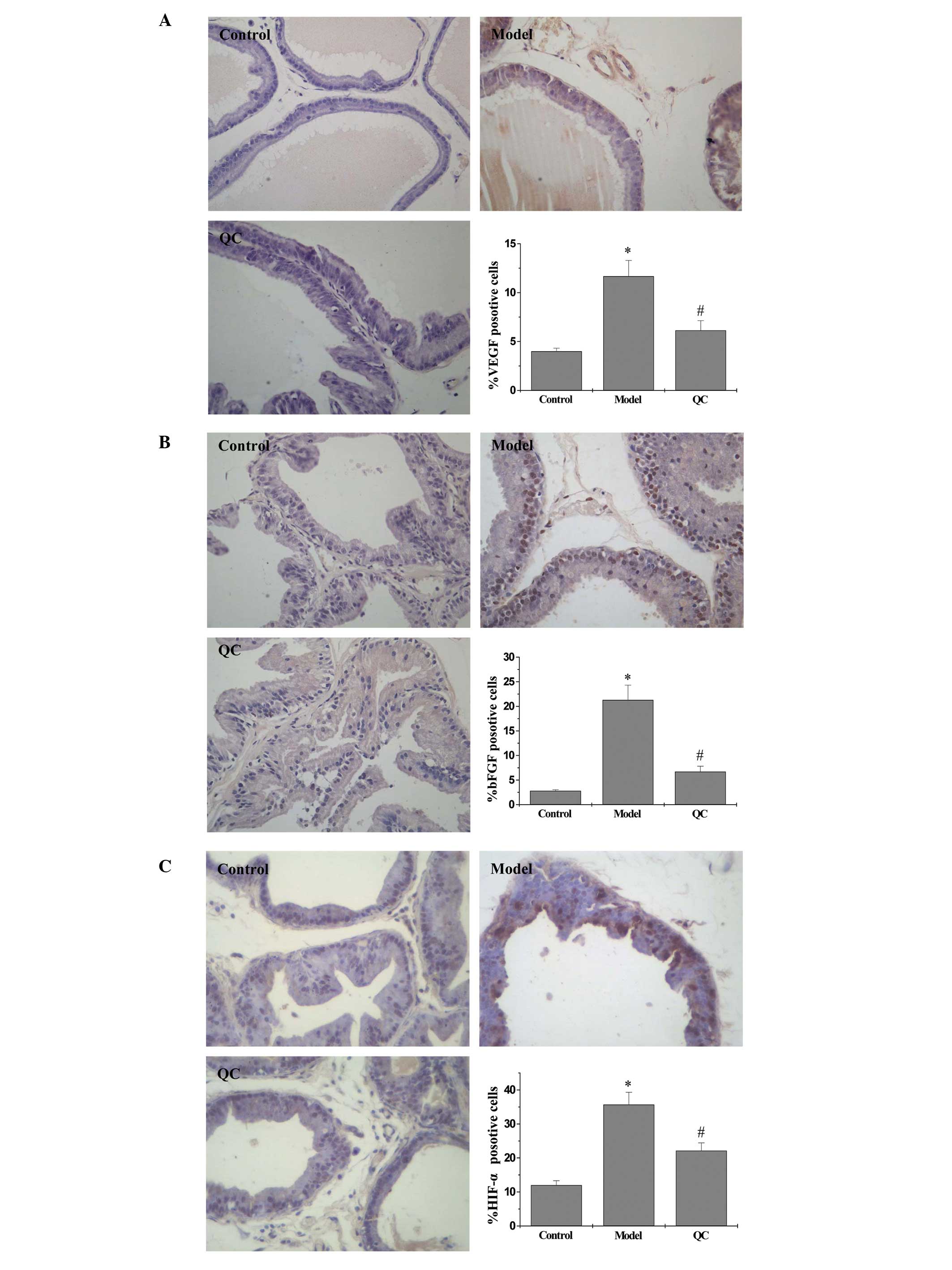|
1
|
O’Malley KJ, Dhir R, Nelson JB, Bost J,
Lin Y and Wang Z: The expression of androgen-responsive genes is
up-regulated in the epithelia of benign prostatic hyperplasia.
Prostate. 69:1716–1723. 2009.PubMed/NCBI
|
|
2
|
Paolone DR: Benign prostatic hyperplasia.
Clin Geriatr Med. 26:223–239. 2010. View Article : Google Scholar
|
|
3
|
Roehrborn CG: Male lower urinary tract
symptoms (LUTS) and benign prostatic hyperplasia (BPH). Med Clin
North Am. 95:87–100. 2011. View Article : Google Scholar : PubMed/NCBI
|
|
4
|
Oh SJ: Unsolved issues in managing benign
prostatic hyperplasia. Korean J Urol. 54:349–350. 2013. View Article : Google Scholar : PubMed/NCBI
|
|
5
|
Folkman J: Is tissue mass regulated by
vascular endothelial cells? Prostate as the first evidence.
Endocrinology. 139:441–442. 1998. View Article : Google Scholar : PubMed/NCBI
|
|
6
|
Soulitzis N, Karyotis I, Delakas D and
Spandidos DA: Expression analysis of peptide growth factors VEGF,
FGF2, TGFB1, EGF and IGF1 in prostate cancer and benign prostatic
hyperplasia. Int J Oncol. 29:305–314. 2006.PubMed/NCBI
|
|
7
|
Ren J, Huan Y, Wang H, et al: Dynamic
contrast-enhanced MRI of benign prostatic hyperplasia and prostatic
carcinoma: correlation with angiogenesis. Clin Radiol. 63:153–159.
2008. View Article : Google Scholar : PubMed/NCBI
|
|
8
|
Lucia MS and Lambert JR: Growth factors in
benign prostatic hyperplasia: basic science implications. Curr Urol
Rep. 9:272–278. 2008. View Article : Google Scholar : PubMed/NCBI
|
|
9
|
Bostanci Y, Kazzazi A, Momtahen S, Laze J
and Djavan B: Correlation between benign prostatic hyperplasia and
inflammation. Curr Opin Urol. 23:5–10. 2013. View Article : Google Scholar : PubMed/NCBI
|
|
10
|
Lin JM, Zhao JY, Zhuang QC, Hong ZF and
Peng J: Xiongshao capsule promotes angiogenesis of HUVEC via
enhancing cell proliferation and up-regulating the expression of
bFGF and VEGF. Chin J Integr Med. 17:840–846. 2011. View Article : Google Scholar : PubMed/NCBI
|
|
11
|
Folkman J: Angiogenesis. Annu Rev Med.
57:1–18. 2006. View Article : Google Scholar
|
|
12
|
Folkman J: Seminars in Medicine of the
Beth Israel Hospital, Boston. Clinical applications of research on
angiogenesis. N Engl J Med. 333:1757–1763. 1995. View Article : Google Scholar : PubMed/NCBI
|
|
13
|
Folkman J: Angiogenesis: an organizing
principle for drug discovery? Nat Rev Drug Discov. 6:273–286. 2007.
View Article : Google Scholar : PubMed/NCBI
|
|
14
|
Lin CM, Chiu JH, Wu IH, Wang BW, Pan CM
and Chen YH: Ferulic acid augments angiogenesis via VEGF, PDGF and
HIF-1 alpha. J Nutr Biochem. 21:627–33. 2010. View Article : Google Scholar : PubMed/NCBI
|
|
15
|
Shi YH, Bingle L, Gong LH, Wang YX, Corke
KP and Fang WG: Basic FGF augments hypoxia induced HIF-1-alpha
expression and VEGF release in T47D breast cancer cells. Pathology.
39:396–400. 2007. View Article : Google Scholar : PubMed/NCBI
|
|
16
|
Andrikopoulou E, Zhang X, Sebastian R, et
al: Current insights into the role of HIF-1 in cutaneous wound
healing. Curr Mol Med. 11:218–235. 2011. View Article : Google Scholar : PubMed/NCBI
|
|
17
|
Hong XY, Wang J and Li Z: AGR2 expression
is regulated by HIF-1 and contributes to growth and angiogenesis of
glioblastoma. Cell Biochem Biophys. 67:1487–1495. 2013. View Article : Google Scholar : PubMed/NCBI
|
|
18
|
Risau W: Mechanisms of angiogenesis.
Nature. 386:671–674. 1997. View
Article : Google Scholar : PubMed/NCBI
|
|
19
|
Lin J, Wei L, Xu W, Hong Z, Liu XX and
Peng J: Effect of Hedyotis Diffusa Willd extract on tumor
angiogenesis. Mol Med Rep. 4:1283–1288. 2011.PubMed/NCBI
|
|
20
|
Goto F, Goto K, Weindel K and Folkman J:
Synergistic effects of vascular endothelial growth factor and basic
fibroblast growth factor on the proliferation and cord formation of
bovine capillary endothelial cells within collagen gels. Lab
Invest. 69:508–517. 1993.
|
|
21
|
Prior BM, Yang HT and Terjung RL: What
makes vessels grow with exercise training? J Appl Physiol (1985).
97:1119–1128. 2004. View Article : Google Scholar : PubMed/NCBI
|
|
22
|
Roehrborn CG, Nuckolls JG, Wei JT and
Steers W; BPH Registry and Patient Survey Steering Committee. The
benign prostatic hyperplasia registry and patient survey: study
design, methods and patient baseline characteristics. BJU Int.
100:813–819. 2007. View Article : Google Scholar
|
|
23
|
Black L, Naslund MJ, Gilbert TD Jr, Davis
EA and Ollendorf DA: An examination of treatment patterns and costs
of care among patients with benign prostatic hyperplasia. Am J
Manag Care. 12(4 Suppl): S99–S110. 2006.PubMed/NCBI
|
|
24
|
MacDonald R and Wilt TJ: Alfuzosin for
treatment of lower urinary tract symptoms compatible with benign
prostatic hyperplasia: a systematic review of efficacy and adverse
effects. Urology. 66:780–788. 2005. View Article : Google Scholar : PubMed/NCBI
|
|
25
|
Djavan B and Marberger M: A meta-analysis
on the efficacy and tolerability of alpha1-adrenoceptor antagonists
in patients with lower urinary tract symptoms suggestive of benign
prostatic obstruction. Eur Urol. 36:1–13. 1999. View Article : Google Scholar : PubMed/NCBI
|
|
26
|
Gormley GJ, Stoner E, Bruskewitz RC, et
al: The effect of finasteride in men with benign prostatic
hyperplasia. The Finasteride Study Group. N Engl J Med.
327:1185–1191. 1992. View Article : Google Scholar : PubMed/NCBI
|
|
27
|
Roehrborn CG, Boyle P, Nickel JC, et al;
ARIA3001 ARIA3002 and ARIA3003 Study Investigators. Efficacy and
safety of a dual inhibitor of 5-alpha-reductase types 1 and 2
(dutasteride) in men with benign prostatic hyperplasia. Urology.
60:434–441. 2002. View Article : Google Scholar : PubMed/NCBI
|
|
28
|
Boyle P, Robertson C, Lowe F and Roehrborn
C: Meta-analysis of clinical trials of permixon in the treatment of
symptomatic benign prostatic hyperplasia. Urology. 55:533–539.
2000. View Article : Google Scholar : PubMed/NCBI
|
|
29
|
Wilt T, Ishani A, MacDonald R, Stark G,
Mulrow C and Lau J: Beta-sitosterols for benign prostatic
hyperplasia. Cochrane Database Syst Rev. CD0010432000.PubMed/NCBI
|
|
30
|
Wilt T, Ishani A, Mac Donald R, Rutks I
and Stark G: Pygeum africanum for benign prostatic hyperplasia.
Cochrane Database Syst Rev. CD0010442002.PubMed/NCBI
|
|
31
|
Lin JM, Huang YP, Zhou Jh and Hong ZF:
Therapeutic efficacy of Qianliening capsules in the treatment of
benign prostatic hyperplasia. Yatai Chuantong Yiyao. 9:140–143.
2013.(In Chinese).
|
|
32
|
Zhou J, Lin J, Xu W, Zhong X, Zheng Y,
Hong Z and Peng J: Qianliening capsule treats benign prostatic
hyperplasia through regulating the expression of sex hormones,
estrogen receptor and androgen receptor. Afr J Pharm and Pharmacol.
6:173–180. 2012. View Article : Google Scholar
|
|
33
|
Zhong X, Lin J, Zhou J, Xu W, Hong Z and
Peng J: Qianliening capsule treats benign prostatic hyperplasia
(BPH) by down-regulating the expression of PCNA, CyclinD1 and CDK4.
Afr J Biotechnol. 11:7731–7737. 2012.
|
|
34
|
Zheng H, Xu W, Lin J, Peng J and Hong ZF:
Qianliening capsule treats benign prostatic hyperplasia via
induction of prostatic cell apoptosis. Mol Med Rep. 7:848–854.
2013.PubMed/NCBI
|
|
35
|
Lin J, Zhou J, Xu W, Zhong X, Hong Z and
Peng J: Qianliening capsule treats benign prostatic hyperplasia via
suppression of the EGF/STAT3 signaling pathway. Exp Ther Med.
5:1293–1300. 2013.PubMed/NCBI
|
|
36
|
Hong ZF, Lin JM, Zhong XY, et al:
Qianliening capsule inhibits human prostate cell growth via
induction of mitochondrion-dependent cell apoptosis. Chin J Integr
Med. 18:824–830. 2012. View Article : Google Scholar : PubMed/NCBI
|
|
37
|
Zheng HY, Xu W, Lin JM, Li H, Zhou JH and
Hong ZF: Toxicological studies on qianliening capsule. Zhe Jiang
Zhong Yi Yao Da Xue Xue Bao Bian Ji Bu. 35:63–65. 462011.(In
Chinese).
|
|
38
|
Tang J and Yang J: Etiopathogenesis of
benign prostatic hyperplasia. Indian J Urol. 25:312–317. 2009.
View Article : Google Scholar
|
|
39
|
Bosch RJ: Pathogenesis of benign prostatic
hyperplasia. Eur Urol. 20(Suppl 1): 27–30. 1991.
|
|
40
|
Huang YP, Du J, Hong ZF, Chen ZQ, Wu JF
and Zhao JY: Effects of Kangquan Recipe on sex steroids and cell
proliferation in rats with benign prostatic hyperplasia. Chin J
Integr Med. 15:289–292. 2009. View Article : Google Scholar : PubMed/NCBI
|
|
41
|
Ferrara N: Role of vascular endothelial
growth factor in physiologic and pathologic angiogenesis:
therapeutic implications. Semin Oncol. 29(6 Suppl 16): 10–14. 2002.
View Article : Google Scholar : PubMed/NCBI
|



















